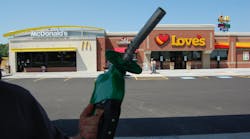Average retail pump prices in the U.S. for both diesel and gasoline registered declines this week, according to data tracked by the Energy Information Administration (EIA), despite the busy highway travel over the July 4th holiday.
Diesel dropped 7/10ths of a penny to a national average of $3.913 per gallon this week, EIA reported, with prices declining in every region of the country. However, the agency noted that’s 8.5 cents higher per gallon compared to the same week in 2013.
Diesel exceeded the $4 per gallon mark in four regions this week: New England at $4.098 per gallon; the Central Atlantic at $4.069; California at $4.135; and the West Coast at $4.067, though that drops to $3.985 when California’s prices are removed from the mix.
The Gulf Coast recorded the biggest one-week decline in diesel prices: 1.4 cents to $3,802 per gallon, which is also the cheapest price for diesel in the U.S. this week, EIA said.
The national average for gasoline dropped 2.6 cents to $3.678 per gallon this week, though that’s 18.6 cents more expensive compared to the same week in 2013, the agency noted.
The EIA also pointed out that gasoline prices increased in only three U.S. regions this week: New England (up 4/10ths of a penny to $3.775 per gallon); the Rocky Mountains (up 1.3 cents to $3.642); and the West Coast, where prices increased 1/10th of a penny to $4.037 with California and jumping 9/10ths of a penny to $3.881 with California left out.
The biggest one week declines in gasoline prices occurred in the Midwest and Central Atlantic, dropping 5.7 cents to $3.614 and 3.1 cents to $3.564, respectively.
The relative declines in diesel and gasoline prices are something of a surprise as holiday travel over the July 4th holiday was expected to increase 1.9% this year versus 2013. AAA projected that 41 million Americans would travel 50 miles from home during the Independence Day holiday period (July 2 through July 6) with more than eight in 10 or 34.8 million traveling by automobile –- the highest level since 2007, the group said.
Yet national average retail gasoline prices held steady around $3.70 per gallon through that travel period, EIA noted, and that although that was one of the highest gasoline prices averages heading into the Fourth of July holiday since 2008, over in 2014 gasoline prices remain well below the spring peaks reached in each of the previous three years.
According to the agency’s analysis, gasoline prices this year did not peak as high as in recent years because of relatively stable crude oil prices in 2014. So far this year, the highest spring peak retail price for gasoline occurred on April 29 at $3.71 per gallon – lower than last year's spring peak of $3.78, and lower than price peaks in 2011 and 2012.
Since April, EIA’s data indicated that the increase in wholesale gasoline prices is lower in percentage terms than the recent increase in crude oil prices: 3.5% for gasoline compared to 7.2% for the North Sea Brent crude oil price benchmark.
Typically during spring and early summer, the agency said petroleum refineries return to service from seasonal maintenance outages, which tends to lower wholesale product prices, including gasoline. While crude oil prices have increased in part because of unrest in Iraq, a major crude oil producer, those factors are largely offsetting each other, leaving retail gasoline prices relatively unchanged.
World crude oil prices have fallen by $4 per barrel from a 2014 peak of $115 per barrel on June 19 and if that trend is sustained, EIA said, that should help bring gasoline prices down in the coming weeks.



